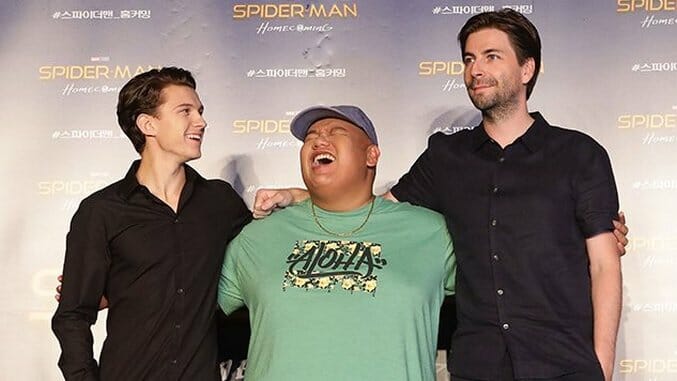Jon Watts Pranks His Way into the MCU
Director Jon Watts tells Paste about the Internet goof that, only three years later, brought him to Spider-Man: Homecoming.
Photos: Chung Sung-Jun / Staff
When Jon Watts was directing Spider-Man: Homecoming, he found it incredibly easy to relate to Peter Parker (Tom Holland) as the novice superhero seeks to hold his own as an Avenger. “He’s a kid getting this huge opportunity and he doesn’t want to screw it up. He thinks he has the right ideas but he’s not sure of the right way to do things,” says Watts.
Watts, whose first two movies—Clown (2014) and Cop Car (2015)—were made for less money than you’d find in Tony Starks’ pockets, was going through the same thing on the set of this Marvel blockbuster. “It was in a constant state of being out of my element,” Watts remembers. “I didn’t pretend I was an expert—I did everything I could to learn as much as I could from all the people I was surrounded by. I learned so much on every level I felt like I was getting a PhD.”
Unlike Parker, Watts, who grew up in Colorado and studied film at NYU, didn’t get bit by a spider; his big break instead came from a goofy prank. Watts, 36, was making commercials, music videos for artists like Fatboy Slim and Death Cab for Cutie, and Onion comedy pieces when he and some friends hit upon a silly idea. Watts was part of Waverly Films, a group of filmmakers who typically made short films, and they thought it would be funny to shoot a trailer for a horror movie called Clown and attach horror guru Eli Roth’s name to it.
“The only thing in our heads was to see if we could fool our Youtube followers,” Watts says. “We did have a story we’d worked out on napkins in a bar after too many beers, but it’s not like there was a script waiting. We just wanted to see if people thought it was real—beyond that we had no thought.”
While some people thought it was real, Eli Roth thought it was a great idea: He tracked down Watts and said they should make the movie, with Roth serving as producer. So Watts and Waverly Films compadre Chris Ford wrote Clown, with Watts directing. The movie didn’t earn much in the way of box office (or positive reviews) but it got Watts’ foot in the feature film door.
His next movie, Cop Car, he also made for virtually nothing, but it both was more artistically ambitious and more personal.
When Watts was young, he and his friends would “walk through fields for hours. You would hope you would find something that would lead to an adventure. There was a garbage dump and you’d find bottles and break them. But you hoped you’d come across an alien spaceship. You don’t and then it starts to get dark and you get scared and then you go home.”
That wasn’t enough for a movie but it provided a spark—what if those kids actually found something?—and an image that bounced around his head for years: “kids in a car that was not theirs, driving around, going faster and faster and they know they shouldn’t be there and no one is stopping them”—and one day he asked Ford, to whom he’d mentioned this idea repeatedly, “What if it was a police car?”
The script came together quickly. The “kids,” young boys (played by James Freedson-Jackson and Hays Wellford), steal the car for a joyride, not realizing that it was in the woods because the astonishingly corrupt sheriff had parked there to dispose of a couple of bodies (one of which was still in the trunk…and still alive).
-

-

-

-

-

-

-

-

-

-

-

-

-

-

-

-

-

-

-

-

-

-

-

-

-

-

-

-

-

-

-

-

-

-

-

-

-

-

-

-








































